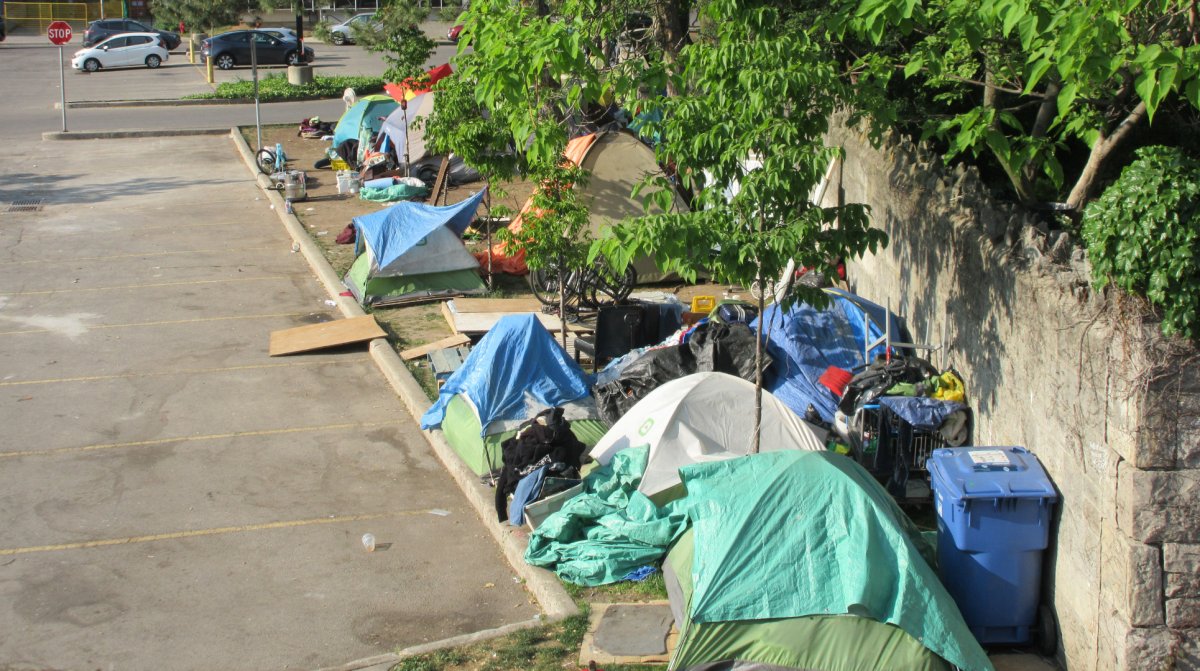Housing executives with Hamilton, Ont. will recommend adaption of a mini homes pilot project as well as access to public washroom and shower facilities in a plan to alleviate the city’s encampment crisis.

The proposed protocol will be in front of councillors Monday, outlining a permanent “coordinated encampment response” following a public consultation over the spring and summer garnering some 12,000 responses and 16,000 comments via a web campaign.
The suggested scenarios assume the need for a minimum of six sites to accommodate 150 individuals currently unsheltered in Hamilton, with a capacity of no more than 25 individuals at each location.
Staff say they are not recommending sanctioning sites just anywhere in the city, just at identified sites with availability in one to two months “without significant” preparation.
Locations under consideration need existing washrooms, drinking water, hydro connections and waste management. Sites near the downtown core are also preferred.
In addition, the spaces cannot hinder park space in a neighbourhood with limited supply.
Staffers are recommending Alexander Park, Strachan Avenue Linear Park, the east side Woodlands Park, Confederation Park, the north side of Mohawk Sports Park, north of the ballpark at Turner Parkand and the north side of Valley Park as potential useable spaces.
Strachan Avenue linear park is the recommended spot for homes proposed by the Hamilton Alliance for Tiny Shelters (HATS), a Hamilton group that have tried to build a small community of tiny shelters for those experiencing homelessness.
- Some 2019 candidates ‘appeared willing’ to engage with foreign interference: Hogue inquiry
- Princess Anne to help commission new navy vessel in B.C. ceremony
- Foreign interference ‘undermined’ public confidence in elections: inquiry
- Canada, Manitoba to develop Red Dress Alert for missing Indigenous women and girls
Consisting of eight-by-10 cabins outfitted with a bed, microwave, mini-refrigerator and door locks, the housing department is recommending a partnership to operate a two-year pilot of up to 25 small homes for occupancy in the fourth quarter of 2023.
The initiative would be free for the city with funding entirely provided by the Alliance.
Director of Housing Michelle Baird said access to washrooms, water, and hydro was a “key piece” in the public consultation, touched on often by both city residents and those experiencing homelessness.
“The community is asking us to address this as are, of course, individuals living unsheltered,” she said.
Additional recommendations in the encampment response include:
- Increased distance between encampments and schools, day-care centres, playgrounds, pools and private property lines. The latter calls for no less than 10 metres while 50 to 100 metres distance is required between a tent and schools or play areas.
- Public Works provide security as well as parks staff to respond to requests for clean-up and maintenance at designated sites servicing those experiencing homelessness.
- Healthy and Safe Communities Department to hire enforcement to oversee amenities and enlisting of peer support workers.
- Seek out “housing-focused” outreach to provide input into Hamilton’s response. Identified partners include Keeping Six, HAMSMArT, Hamilton Regional Indian Centre and Hamilton Encampment Support Network.
Last month the city estimated there were some 100 encampments housing the 165 people sleeping rough.
About 1,732 people in total across the city are considered to have issues with permanent housing.
The proposal revealed that the public consultations, which included three in-person sessions on the Mountain, downtown and in Ancaster, gave no clear consensus on whether or not to adopt sanctioned sites as an approach.
But there was a “strong consensus” that tents in parks were not welcome, and that a more permanent housing-focused solution is preferred.
Housing services will also present “budget asks” Monday suggesting what financing will be needed for permanent supportive housing solutions.
Costs for implementation of the recommended encampment protocol between September and March of next year would be covered through the tax stabilization reserve at an estimated $805,000.
About $1.6 million is being proposed from the 2024 tax operating budget, via a 0.15 per cent levy, as a permanent annual cost.





Comments